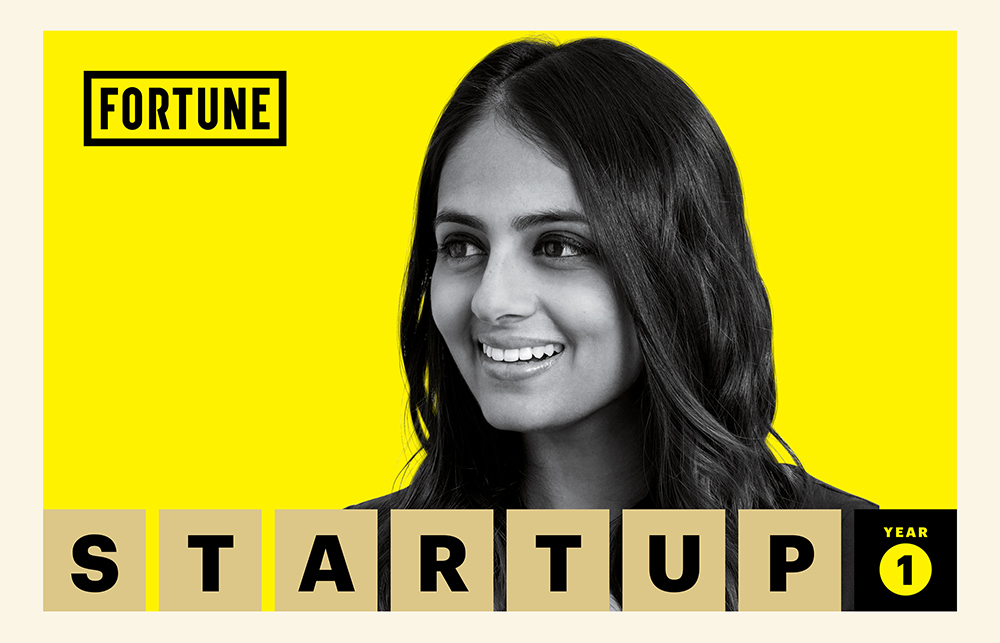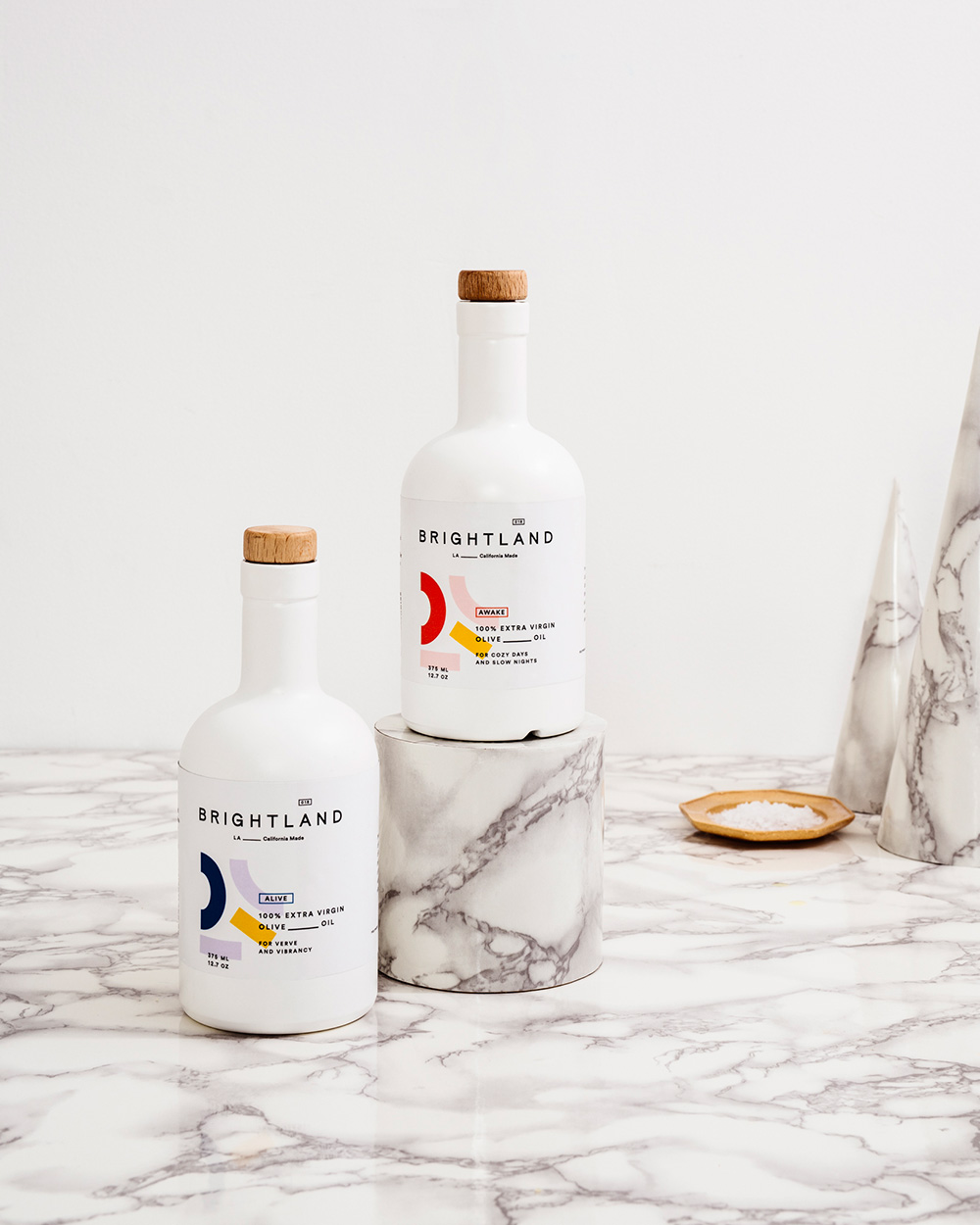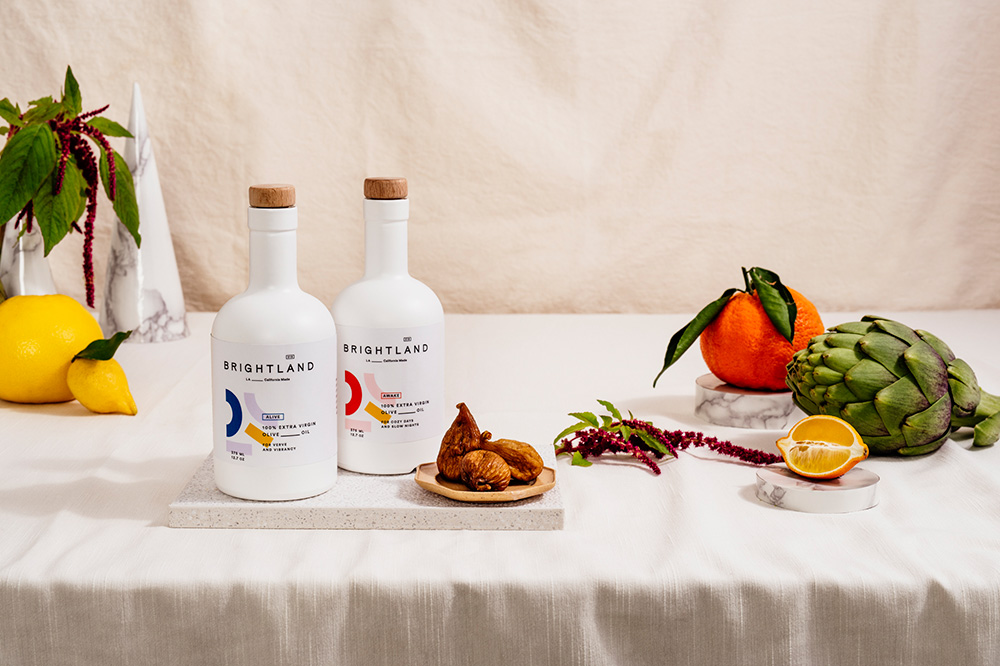
本文属于《创业第一年》系列特别报道,主要采访创始人,了解企业运营第一年学到的主要经验教训。
20世纪80年代,艾西瓦娅·伊耶和她的家人从印度移民到美国。当时她还只有6个月大,成长阶段大部分在休斯顿度过。伊耶说,家里人希望她能成为医生、工程师或者律师,但她只想走出一条自己的道路。
伊耶曾就读于纽约大学加勒廷个性化学习学院,职业生涯则开始于巴黎欧莱雅,在兰蔻品牌任职,后又先后供职于多家风投投资的创业公司,在传讯与公共事务部门工作。
此后,伊耶创办了自己的公司——Brightland,专营手工制作的特级初榨橄榄油。
近期,《财富》杂志采访了伊耶,了解其创业第一年的经营状况,获得了什么经验、克服了哪些困难,还询问了其对下一年的规划。
为简明起见,以下采访内容有所删减。
《财富》:橄榄油是厨房必备,但未必每个人都想进入这个行业。与红酒相似,橄榄油这个行业历来都是家族企业的天下。是什么促使你创办了Brightland?它与市场上的其他品牌又有何不同?
伊耶:2014年,我在纽约认识了我的伴侣,有天在家里吃完饭后,我俩就开始一直胃痛,非常难受。经过仔细排除,我们发现罪魁祸首既不是面包,也不是奶酪甚至香料,而是令人意想不到的橄榄油。这促使我做了一些调研,结果发现,由于橄榄油行业缺乏透明度且骗子横行,美国人食用的橄榄油中有近70%已经腐坏变质。所以,我就下定决心给这样一个黑心产业带来一些阳光。
于是,我调转了职业方向,决定从橄榄油开始,打造一种大胆、优质、可追溯的厨房基本食材解决方案。我把家搬到了洛杉矶,并对加州蓬勃发展的本地橄榄油产业进行了一番研究。
2018年,Brightland正式成立。我们与生产有机产品、合理支付工资并生产新鲜特级初榨橄榄油的家庭农场建立起了合作关系。我们还特别在设计上下了些功夫,打造出了与传统产品颇不相同的包装瓶。目前,我们正在开发第一款非橄榄油产品,采用的标准和流程与开发橄榄油产品一样。我们坚持选用高品质原材料,寻找注重营养价值的农场合作伙伴,使用鲜果,同时也将设计融入我们带给这个世界的每一件产品中。

作为品牌创始人兼首席执行官,你现在每天的工作和生活是怎样的?
我们的团队很小,现在大家都在远程办公,幸好可以采用这种工作方式。因为在一些不懂得尊重“边界”的公司工作过,所以我一早就决定尽可能地不把Slack作为我们的办公工具,如果有事我们就打电话或者发邮件。
至于日常工作,可能主要就是跟运营主管一起检查社论和社交媒体上的内容,讨论产品路线图、库存预测以及时间表,查看盈亏情况和预算,通过社交媒体与客户直接沟通,和品牌合作伙伴进行电话沟通,检查新网站的设计和开发编辑。当然,还要在新产品发布前对配方和产品进行测试。
创业第一年你遇到的最大困难有哪些?最让你意外的是什么?
创业的前12个月,我没有拿朋友、家人或天使投资一分钱,所以我们在处理创意、营销、库存规划、现金流等工作时都必须严控预算。一开始我觉得这可能就是创业中最具挑战性的部分了,但后来才发现,其实最具挑战性的事情是调整自己的思维模式。
我必须要放下“稀缺”思维,转而用“丰富”思维去思考问题,这是一个非常大的转变,也非常有挑战性。如果你的身边,尤其是社交媒体上一直有各种噪音干扰,那么这种思维转变就会一直是一种挑战。对创业者而言,保持“丰富”思维非常重要,因为只有这样你才能做出积极、乐观且符合自己价值观的决策。而稀缺思维则会导致短视、恐慌、害怕错过的想法,进而损害品牌和业务。对于创业者来说,这种思维会让你感觉筋疲力尽、疲于奔命。
因为疫情尚未得到控制,零售业的前景看起来还会继续恶化,但杂货店通常不会受到经济衰退的影响。不过,对于消费者来说,Brightland更像是一种高端产品,你们是否计划在近期调整业务布局?
我们是一家“直销”第一的公司,但同时也有合作的战略零售合作伙伴。新冠疫情爆发后,我们失去了一些零售合作伙伴的大额采购订单,但与此同时,直销渠道的订单却出现了大幅增长。因为现在大家在家的时间更多了,做饭也就更频繁了,所以我们推出了《光明一面》(On the Bright Side)系列视频,内容包括烹饪节目;与红酒、奶酪、茶业等行业的专家举行的问答环节;以及现场水彩绘画节目等,为大家提供一些积极、舒缓压力的内容。

与此同时,从产品开发、融资等角度来看,经济停摆对公司的未来有什么影响?
我们许多内部工作的推进速度因此而减慢了。从某些方面来说,经济停摆更能让我们集中注意力,而在其他方面,停摆又降低了整个供应链的运转速度。我们正在开发三款新产品。通常我们的节奏是很快的,但现在取样、与合作伙伴、农场、供应商的合作以及远程办公团队的沟通联络都明显地减缓了产品的开发速度。
再过一年或几年,等疫情结束之后,你计划如何发展Brightland?你希望公司在五年后发展成什么样子?
企业成长也需要打好基础。我们正在积极搭建一个交叉环境保护主义框架,覆盖Brightland从招聘、创意、伙伴关系、编辑、联盟到整体商业战略的方方面面。交叉环境保护主义是一种更具包容性的环境保护主义,倡导在保护地球的同时也要保护人类。我们有这种想法是受到了利亚·托马斯的启发,她是一名交叉环境保护主义活动家,也是她创造了“交叉环境保护主义”这个词。
我们也一直在倡导回归生活的理念。毫无疑问,现代人太过沉迷于手机。所以我们一直鼓励客户和社区退后一步,放下手机到厨房里做做饭,去享受简单惬意的居家生活。(财富中文网)
译者:Feb
本文属于《创业第一年》系列特别报道,主要采访创始人,了解企业运营第一年学到的主要经验教训。
20世纪80年代,艾西瓦娅·伊耶和她的家人从印度移民到美国。当时她还只有6个月大,成长阶段大部分在休斯顿度过。伊耶说,家里人希望她能成为医生、工程师或者律师,但她只想走出一条自己的道路。
伊耶曾就读于纽约大学加勒廷个性化学习学院,职业生涯则开始于巴黎欧莱雅,在兰蔻品牌任职,后又先后供职于多家风投投资的创业公司,在传讯与公共事务部门工作。
此后,伊耶创办了自己的公司——Brightland,专营手工制作的特级初榨橄榄油。
近期,《财富》杂志采访了伊耶,了解其创业第一年的经营状况,获得了什么经验、克服了哪些困难,还询问了其对下一年的规划。
为简明起见,以下采访内容有所删减。
《财富》:橄榄油是厨房必备,但未必每个人都想进入这个行业。与红酒相似,橄榄油这个行业历来都是家族企业的天下。是什么促使你创办了Brightland?它与市场上的其他品牌又有何不同?
伊耶:2014年,我在纽约认识了我的伴侣,有天在家里吃完饭后,我俩就开始一直胃痛,非常难受。经过仔细排除,我们发现罪魁祸首既不是面包,也不是奶酪甚至香料,而是令人意想不到的橄榄油。这促使我做了一些调研,结果发现,由于橄榄油行业缺乏透明度且骗子横行,美国人食用的橄榄油中有近70%已经腐坏变质。所以,我就下定决心给这样一个黑心产业带来一些阳光。
于是,我调转了职业方向,决定从橄榄油开始,打造一种大胆、优质、可追溯的厨房基本食材解决方案。我把家搬到了洛杉矶,并对加州蓬勃发展的本地橄榄油产业进行了一番研究。
2018年,Brightland正式成立。我们与生产有机产品、合理支付工资并生产新鲜特级初榨橄榄油的家庭农场建立起了合作关系。我们还特别在设计上下了些功夫,打造出了与传统产品颇不相同的包装瓶。目前,我们正在开发第一款非橄榄油产品,采用的标准和流程与开发橄榄油产品一样。我们坚持选用高品质原材料,寻找注重营养价值的农场合作伙伴,使用鲜果,同时也将设计融入我们带给这个世界的每一件产品中。
作为品牌创始人兼首席执行官,你现在每天的工作和生活是怎样的?
我们的团队很小,现在大家都在远程办公,幸好可以采用这种工作方式。因为在一些不懂得尊重“边界”的公司工作过,所以我一早就决定尽可能地不把Slack作为我们的办公工具,如果有事我们就打电话或者发邮件。
至于日常工作,可能主要就是跟运营主管一起检查社论和社交媒体上的内容,讨论产品路线图、库存预测以及时间表,查看盈亏情况和预算,通过社交媒体与客户直接沟通,和品牌合作伙伴进行电话沟通,检查新网站的设计和开发编辑。当然,还要在新产品发布前对配方和产品进行测试。
创业第一年你遇到的最大困难有哪些?最让你意外的是什么?
创业的前12个月,我没有拿朋友、家人或天使投资一分钱,所以我们在处理创意、营销、库存规划、现金流等工作时都必须严控预算。一开始我觉得这可能就是创业中最具挑战性的部分了,但后来才发现,其实最具挑战性的事情是调整自己的思维模式。
我必须要放下“稀缺”思维,转而用“丰富”思维去思考问题,这是一个非常大的转变,也非常有挑战性。如果你的身边,尤其是社交媒体上一直有各种噪音干扰,那么这种思维转变就会一直是一种挑战。对创业者而言,保持“丰富”思维非常重要,因为只有这样你才能做出积极、乐观且符合自己价值观的决策。而稀缺思维则会导致短视、恐慌、害怕错过的想法,进而损害品牌和业务。对于创业者来说,这种思维会让你感觉筋疲力尽、疲于奔命。
因为疫情尚未得到控制,零售业的前景看起来还会继续恶化,但杂货店通常不会受到经济衰退的影响。不过,对于消费者来说,Brightland更像是一种高端产品,你们是否计划在近期调整业务布局?
我们是一家“直销”第一的公司,但同时也有合作的战略零售合作伙伴。新冠疫情爆发后,我们失去了一些零售合作伙伴的大额采购订单,但与此同时,直销渠道的订单却出现了大幅增长。因为现在大家在家的时间更多了,做饭也就更频繁了,所以我们推出了《光明一面》(On the Bright Side)系列视频,内容包括烹饪节目;与红酒、奶酪、茶业等行业的专家举行的问答环节;以及现场水彩绘画节目等,为大家提供一些积极、舒缓压力的内容。
与此同时,从产品开发、融资等角度来看,经济停摆对公司的未来有什么影响?
我们许多内部工作的推进速度因此而减慢了。从某些方面来说,经济停摆更能让我们集中注意力,而在其他方面,停摆又降低了整个供应链的运转速度。我们正在开发三款新产品。通常我们的节奏是很快的,但现在取样、与合作伙伴、农场、供应商的合作以及远程办公团队的沟通联络都明显地减缓了产品的开发速度。
再过一年或几年,等疫情结束之后,你计划如何发展Brightland?你希望公司在五年后发展成什么样子?
企业成长也需要打好基础。我们正在积极搭建一个交叉环境保护主义框架,覆盖Brightland从招聘、创意、伙伴关系、编辑、联盟到整体商业战略的方方面面。交叉环境保护主义是一种更具包容性的环境保护主义,倡导在保护地球的同时也要保护人类。我们有这种想法是受到了利亚·托马斯的启发,她是一名交叉环境保护主义活动家,也是她创造了“交叉环境保护主义”这个词。
我们也一直在倡导回归生活的理念。毫无疑问,现代人太过沉迷于手机。所以我们一直鼓励客户和社区退后一步,放下手机到厨房里做做饭,去享受简单惬意的居家生活。(财富中文网)
译者:Feb
This is an installment in a special series, Startup Year One, interviewing startup founders about the major lessons they learned in the immediate aftermath of their business’s first year of operation.
Aishwarya Iyer and her family emigrated from India to the U.S. when she was just 6 months old in the 1980s, and she grew up mostly in Houston. Iyer says she was expected to become a doctor, engineer, or a lawyer—but she was intent on breaking molds.
Iyer attended New York University, studying at the Gallatin School of Individualized Study. She started her career at L’Oréal, under the Lancôme brand, and has worked at a number of venture-backed startups in communications and public affairs.
Iyer has since launched her own company, Brightland, a handcrafted extra virgin olive oil brand.
Fortune recently spoke with Iyer to learn more about the startup's first year in business, the lessons learned, the hurdles overcome, and plans for the next year.
The following interview has been condensed and lightly edited for clarity.
Fortune: Olive oil is one of those kitchen staples that virtually everyone has, but it's not necessarily a business everyone can get into. Much like wine, it has a history of being associated with family-owned producers. What inspired the launch of Brightland? And how does it stand apart from what else is already on the market?
Iyer: When I met my partner in New York City in 2014 and started cooking meals at home, we both found ourselves left with consistent, uncomfortable stomach pain. After cutting out the obvious culprits like bread, cheese, even spices, the only constant left was olive oil. The discovery inspired some research where I quickly discovered that nearly 70% of olive oil Americans consume is already rotten or rancid due to a fraud-ridden industry with little to no transparency. I was determined to shine light on the dark industry.
So I pivoted careers and set out to create a bold, elevated, and traceable solution to pantry staples, beginning with olive oil. I moved to Los Angeles, and researched the domestic olive oil industry that is burgeoning here in California.
Brightland officially launched in 2018. We partner with family farms that practice organic practices, pay fair wages, and are crafting fresh extra virgin olive oil. We also made a conscious decision to focus on design; our bottles do not look like traditional olive oils. Now we are in the process of launching our first category outside of olive oil, and we are applying the same framework around sourcing, finding the right nutrient-dense farm partner, using fresh fruit, and incorporating design into everything we put out into the world.
As founder and CEO of your own brand, what does an average day look like for you?
We are a very small team, and right now we are all fortunate to be able to be remote working from our homes. We do not have Slack, by design, and it is a decision I made early on, after working at companies that clearly did not understand boundaries. I decided that I would hold off on implementing Slack as a workplace tool for as long as possible. So we pick up the phone and call each other, or we send emails.
A typical day could be reviewing editorial and social content, discussing product road maps, inventory projections, and timelines with our operations lead, looking at our [profit and loss] and budgets, DM-ing with customers on social, jumping on calls with brand partners, reviewing new site design and dev edits, and of course, recipe and product testing before we are about to launch something new.
What were some of the biggest hurdles you faced in the first year of business? What surprised you the most?
I bootstrapped the company for the first 12 months and did not take any outside capital—zero friends and family, angels, etc.—so we had to be incredibly scrappy with everything from creative and marketing to inventory planning and cash flow. I thought that would be the most challenging part of the business, but it was actually my mind.
I had to stop thinking from a “scarcity” mindset to an “abundance” mindset, and that was a huge shift that was quite challenging—and continues to be challenging when you’re surrounded by the incessant noise, especially on social media. It’s incredibly important for an entrepreneur to live in the abundance mindset, because that is when you can make decisions that are positive, optimistic, and fit your values. Operating from a place of scarcity leads to short-term, panicked, FOMO thinking, and decision making that ultimately hurts the brand and business. It’s exhausting for the entrepreneur to be coming from that place.
As the pandemic continues, the outlook for retail is only looking more dire, but grocery is typically recession-proof space. Still, Brightland might be regarded as more of a premium product for consumers. Does Brightland plan to adjust its business plan for the immediate future?
We have always been a [direct-to-consumer]-first business with strategic retail partners who we work with. When COVID started, we lost some large [purchase orders] from a few retail partners, but we saw a spike on our DTC channel. Since people are at home and cooking more, we introduced a digital content series called "On the Bright Side," where we have been hosting cooking episodes, Q&As with experts in wine, cheese, tea, etc., and live watercolor paintings, to serve as a place for some positivity and calming content.
At the same time, how has the economic shutdown affected the future of the business, from product development to raising capital?
The shutdown has slowed things down for us internally. In some ways, it has allowed us to truly focus, and in other ways, everything in our supply chain is slower. We are working on three new products right now. Getting samples, working with our partners, farms, and vendors, and liaising as a remote team have definitely slowed down the usual sprinting process.
Looking beyond the post-pandemic era, which could be anywhere from a year to a few years from now, how do you plan to grow Brightland and what do you want the business to look like five years from now?
Before we become a larger organization, we want to set some foundations. We are actively building an intersectional environmentalism framework that will apply to all Brightland hiring, creative, partnerships, editorial, alliance and overall business strategy. Intersectional environmentalism is an inclusive version of environmentalism that advocates for both the protection of people and the planet. We have been so inspired by the work of Leah Thomas, an intersectional environmental activist who officially coined the term.
We have also been championing the concept of analog versus digital. I firmly believe that we are all way too addicted to our phones. So as a brand, we always encourage our customers and community to take a step back, spend time in their kitchens without devices, and savor simple, everyday moments at home.






